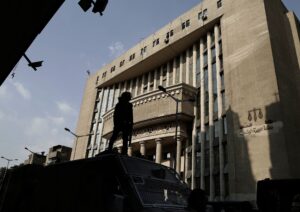
Masked ICE Agents Detain 9-Month-Pregnant U.S Citizen in L.A. Crackdown
A U.S. citizen in her ninth month of pregnancy was hospitalized with sharp stomach pains after being arrested — and later released — by ICE agents who accused her of obstructing the arrest of her undocumented husband. ICE has been conducting large-scale raids and arrests of undocumented people at workplaces in the Los Angeles areas. Protests against the arrests grew increasingly volatile over the weekend after the president federalized the National Guard — and later deployed active duty U.S. Marines — to the city in what local officials called an excessive and incendiary response to the unrest.

Troops and Marines Deeply Troubled by LA Deployment: ‘Morale is not Great’
California national guards troops and marines deployed to Los Angeles to help restore order after days of protest against the Trump administration have told friends and family members they are deeply unhappy about the assignment and worry their only meaningful role will be as pawns in a political battle they do not want to join. Three different advocacy organisations representing military families said they had heard from dozens of affected service members who expressed discomfort about being drawn into a domestic policing operation outside their normal field of operations.

With Trump as Ally, El Salvador’s President Ramps up Crackdown on Dissent
Authorities in El Salvador have targeted outspoken lawyers, journalists investigating Bukele’s alleged deals with gangs and human rights defenders calling for the end of a three-year state of emergency, which has suspended fundamental civil rights. Some say they have been forced to flee the country. In recent weeks, those who have long acted as a thorn in Bukele’s side say looming threats have reached an inflection point. The crackdown comes as Bukele has garnered global attention for keeping some 200 Venezuelan deportees detained in a mega-prison built for gangs as part of an agreement with the Trump administration.

I was Wrongfully Imprisoned Abroad. The US Must do More to Help People Like Me.
This summer will mark five years since I was kidnapped and wrongfully imprisoned by the Rwandan government. For 939 days, I sat in prison, cut off from my family and community. I was held in solitary confinement, denied medical care and often unable to speak with my lawyers. The days felt endless ‒ like a nightmare I couldn’t escape. For my family, it was a different sort of nightmare. Overnight, their lives were transformed. My wife and children were left to navigate the complex web of U.S. federal offices tasked with hostage recovery. My family became full-time advocates for my return, pleading my case before U.S. government officials and sharing my story with the news media.


